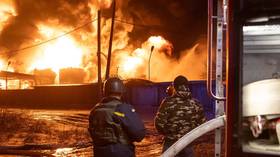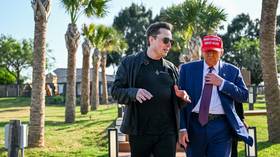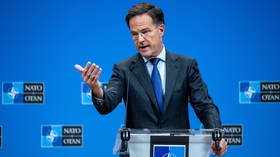Interview with Arkady Dvorkovich

Arkady Dvorkovich, the Head of Expert Administration and President’s Economic Advisor, who is currently at the Saint-Petersburg Forum, spoke on Russia Today to about the importance of the event for Russia and its further integration into the interna
Arkady Dvorkovich: The prove of the importance of this forum is the presence of hundreds of top-level managers of international companies and federal officials. Also, the forum is taking place in parallel with the informal summit of CIS leaders. All CIS leaders are coming to Saint-Petersburg to meet at the forum and outside it with the Russian President to discuss a number of major questions. These are issues related to the future development of the Commonwealth of Independent States, as well as the dialogue between the CIS and Europe and CIS countries and Europe in particular. So, it is not only an important economic forum but also important political event.
Russia Today: The Forum is taking place for the 11th time that means it started in 1996. Just in brief, how has the Russian economy changed since 1996?
A.D.: Russian economy went through a period of deep transformation, not only in numerical terms but also in terms of quality. We are already experiencing high rates of economic growth, investment growth, consumption growth, and higher living standards for the majority of the Russian people. Right now – if compared to this [previous] period we are already confident that Russian economy is going to be successful. And this is based on the understanding that we have all chances to be an integral part of the international financial and investment community, that we an open economy, an open country able to compete and bring benefits for the Russian people.
Earlier, Arkady Dvorkovich shared with Russia Today his thoughts on the ideas and plans in the Russian President's Annual Address on Thursday.
Russia Today: Can we have your reaction to the moratorium on CFE Treaty? Will Russia implement it?
Arkady Dvorkovich: Basically, the President proposed a dialogue to our partners. The implementation of the treaty and mutual interests ought to be discussed. If it transpires that our partners are not ready to take mutual interests into account, Russia will think about the moratorium.
RT: But at the first stage he's very keen to have a dialogue?
A.D.:Exactly.
RT: What was the most fundamental issue he raised in the address?
A.D.: The most fundamental issue is to change things in the Russian economy switching to innovation, to change the way of thinking about the economy, to switch from the export of crude to more sophisticated products, from simple production to hi-tech production, etc.
RT: In fact, Russia starts to spend money it has been earning, re-investing back into the country.
A.D.: It is an instrument to implement the new policy of supporting private initiative. We need money for that. It is a crime not to use the resources earned from oil export for these purposes.
RT: It will be a huge mistake not to re-invest the resources for the future prosperity of the country?
A.D.: Not only for the future, but also for the current generation. We need to pay our debts to our pensioners.
RT: You mentioned pensioners. What is the plan there? I gather a huge increase in pensions. Is that feasible?
A.D.: The plans is channeled in two directions: firstly, to increase the pensions of the current pensioners; secondly, to stimulate the accumulation of pension accounts for the future, to encourage private pension accumulation.
RT: Now it is talked about increasing state pensions by 65%.
A.D.: 65% over a three-year period, which is feasible and accounted for in the budget. The goal is to move even further – a 65% increase is the minimum.
RT: Let us talk about other benefits the current generation can enjoy. There has been a mention of housing as there is a severe crisis in housing at the moment in the country. This is well overdue, isn't it?
A.D.: Currently, we have 3 billion square meters of housing in the country. More than half of it needs repair. Around 100 million meters is completely outdated and should be just demolished rather than repaired. We need to resolve at least these two issues: to destroy 100 million meters over, let's say, ten years and to build a sufficient amount of housing to create normal housing conditions for all the population of Russia.
RT: And certainly roads, infrastructure, electricity. We are going to see a huge change if all this is true, if all these promises come to life. We are going to see massive change in the country over the next ten years, aren't we?
A.D.: This is what we tried to do over the last few years. We tried to build reserves to set big new tasks for ourselves. We are starting these projects. We did not have the resources to start that before. Now we have them.
RT: Much of the current wealth in Russia is due to oil. It is a rather interesting change in policy; rather than exporting crude oil, I mentioned earlier, refining oil within the country. How important is that to the economy?
A.D.: It is of greater value in Russia, which means more economic prosperity. The export of crude oil is good, and we are not going to stop it, but increase the share of refined products. We will certainly support overall energy security in the world, continuing to export oil, gas and electricity.
RT: Is that Mr Putin's way of leaving a legacy – as he said he is not going to be standing for the presidency next year? In ten-twenty years time he will be the president everybody will be saying about: “Look, he is one who spent all the money, he is one who made a decision to really improve living conditions for people in Russia.”
A.D.: It is only a list of tasks for these years, before he leaves office. We will have some new tasks ahead for the new term.
Earlier, Arkady Dvorkovich commented for Russia Today on the budget project 2007 and on the procedure it will face, being passed through State Duma Deputies.
Regarding what has happened to the draft to the moment and the structure of the further procedure:
“No, it is not a final version. We will have 4th reading as the final version. In the 3rd reading we define all budget items figure by figure or all purposes. The final reading is about the text of the budget. So, all policy items will be included in the firth reading and it is equally important as the third reading. Then the budget will go to the upper chamber of the Parliament – Federation Council and then for the presidential signature. ”
He said the main feature of the budget is increased investments.
“On the one hand, these are investments in the human capital – health and education, in particular. These locations are in the context of priority of national projects, which will be spent for higher salaries of teachers and doctors, for the construction of new hospitals and for new equipment for hospitals and schools, for innovation program of leading Russian Universities. Investment in Human capital is strongest part of this budget. On the other hand, investment will be directed into physical infrastructure. We are talking about power energy, special economic zones in the techno-parks and about new road construction for the development of roads all over Russia. It is the continuation of the policy, started 5 years ago. This budget provides for financial stability, as it was previous year. This budget will not undermine financial stability that we have already achieved and inflation that we will continue calm down. Secondly, we have the second year of implementation of national projects, and we have increased allocations for these purposes. During the first year 2006 we learned how to do this, how to spend money efficiently. Very soon we are completing implementation of the task that was set by the president – doubling wages of budget employees. In 2007 we will complete this job and this will mean that wages will double over the 2006-2007 period.”
Arkadiy explains, why the figure of budget surplus is rather high – one and a half trillion roubles:
“We need to have base for comparison. If we tae other countries that export oil and gas, they have much higher budget surpluses. So, we are not the most saving country in the world in this context. Our surpluses 2,5 per cent of GDP, which is high for us, but in relation to the countries, like Saudi Arabia, or even Kazakhstan, it is rather small. We try to spend money in more efficient way. We are like a person, who gets present and put some money into his saving account and spend on housing or a new car, or for medical insurance. This money is needed for future pensions, for future reforms, construction of infrastructure and future potential crisis. ”












